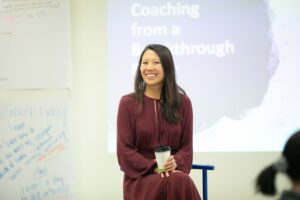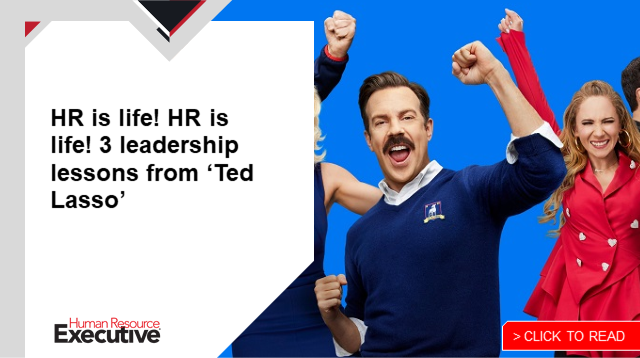Jennie Yang, vice president of people and culture at HR software company 15Five, had a busy morning. She helped create a plan that increased engagement among the company’s 260 remote employees in about a dozen countries; learned how to apply evidence-based practices to internal programs; developed a curriculum for the company’s accelerator and manager enablement programs; and clarified the role and responsibilities of in-house people business partners to better drive or accomplish business objectives.
And it wasn’t even noon.
Yang, one of HRE‘s Rising Stars of HR for 2022, has a remarkable career journey to tell. Initially, she was hired in 2018 at 15Five as director of customer success. Almost two years later, she was promoted to director of talent transformation and then assumed her current role last year. Before joining this company, she had never held an HR position. Yang credits her nontraditional HR background and fine-tuned business acumen for her success.

“When you’re able to drive results for an organization or drive toward outcomes and demonstrate transferrable skills and leadership, especially in an organization that’s growing fast, it’s absolutely possible to make that internal transition and demonstrate your aptitude by way of accomplishing outcomes for the business,” says Yang.
Her business-centric background enables her to understand the implications of talent and driving business results, adds Ben Brooks, one of the competition’s judges and also founder and CEO of Pilot, Inc., a virtual program for HR leaders to help boost productivity, morale and engagement.
Greatest accomplishment: Revamping the company’s compensation strategy and program design. This entailed reassessing 15Five’s existing compensation philosophy and program and then partnering with the executive team to design a program that would be competitive in the market and would attract, retain and motivate top talent.
“She represents a much more agile and adaptive HR professional,” he says, explaining that she can strategize and grab a shovel, which is a rare breed. “She’s got the kind of agility and pacing to be able to meet the moment.”
Even her leadership style contains an element that she describes as “soft fierceness.” She points to her ability to deeply listen to people’s needs and desires, offer a safe space for employees to address their fears, aspirations and pain points, and challenge them to be “uncomfortable” by thinking in different ways. She also challenges herself to have uncomfortable conversations with employees at all levels of the organization, including providing constructive feedback to members of the executive team.
Earlier this year, Yang led the development of a compensation philosophy and program. This included an in-depth analysis of employee compensation across all roles and creating opportunities for increased rewards based on impact and behavior over time.
She developed an annual bonus plan as a percent of base salary, advocated that the company meet its overall revenue targets before paying out bonuses, orchestrated internal change management by training company executives, leveraged data to advocate for change and then executed the company’s inaugural merit cycle that linked performance to compensation.
 “We had individual interviews with each executive to understand where they believed our approach should be with compensation,” she says, adding that there was a lot of back-and-forth tweaking and soliciting buy-in from the executive team. “The biggest challenge was staying ahead of the need for us to roll this out. There were a lot of last-minute [changes] because we were moving so fast.”
“We had individual interviews with each executive to understand where they believed our approach should be with compensation,” she says, adding that there was a lot of back-and-forth tweaking and soliciting buy-in from the executive team. “The biggest challenge was staying ahead of the need for us to roll this out. There were a lot of last-minute [changes] because we were moving so fast.”
Another project she led involved developing a career advancement framework with three separate tracks to ensure consistency, clarity and connected opportunities for upward and lateral mobility across the organization. She also revamped performance ratings by creating a system that valued both results and behaviors when assessing and rating employee performance.
“Right now, I’m very bogged down in day-to-day operations,” says Yang, who wants to carve out consulting time with other HR leaders to boost her strategic business acumen. “I need to create space to understand where the market is going, what I will need to anticipate three years down the road, so I can [continue] being the strategic leader that I am. I want to get to a 12-to-24-month timeline, make priorities to start doing more research and talk to folks so I can inform what our long-term strategy will be.”
Her hope is to evolve into an HR leader whom staff perceived as a coach or mentor, one who helps them achieve outcomes they didn’t think were possible and whom they rank among the best leaders throughout their careers.
“I want to help them grow in their career and achieve outcomes that they didn’t realize they could accomplish,” Yang says. “I want employees to perceive that HR enables managers and leaders to create conditions for an inclusive and psychologically safe environment where people feel seen, heard and valued.”
Greatest challenge: Developing and executing a comprehensive plan to recruit 50 employees at a software firm that the company was acquiring. This was the largest cohort of new hires onboarded at the same time. Her efforts resulted in a 100% acceptance rate.

